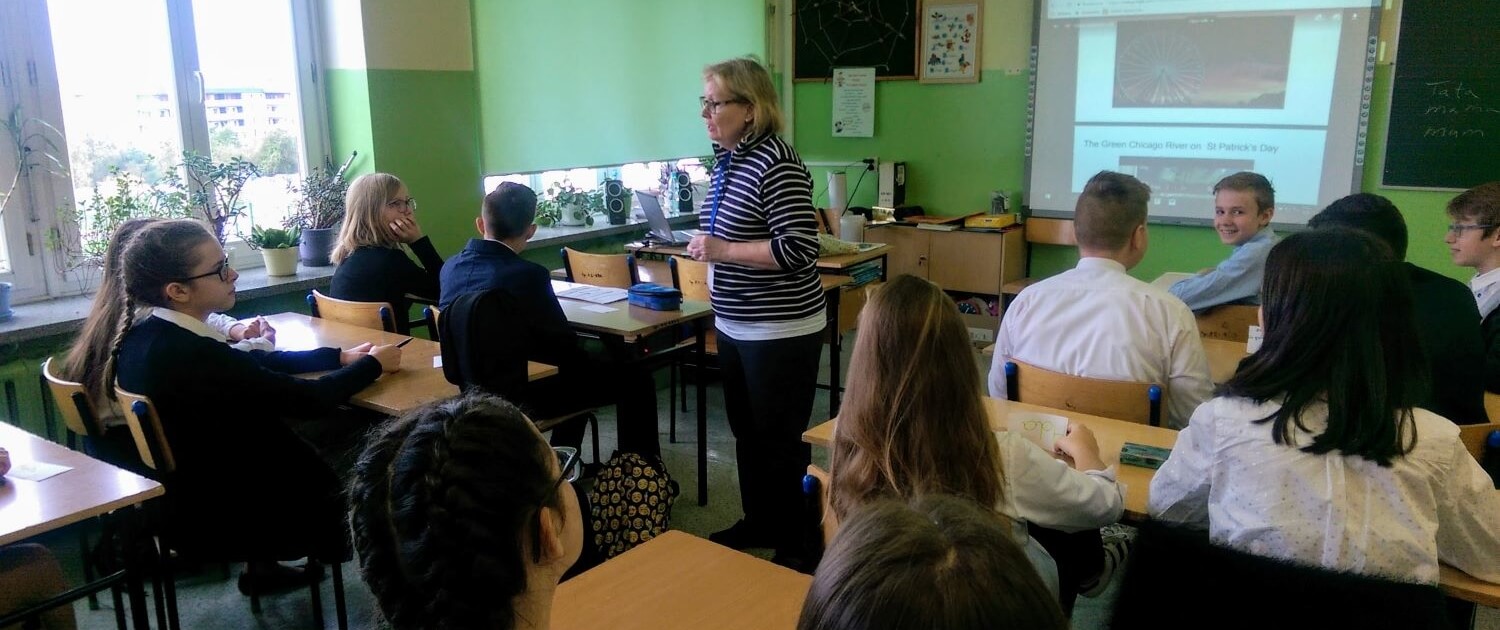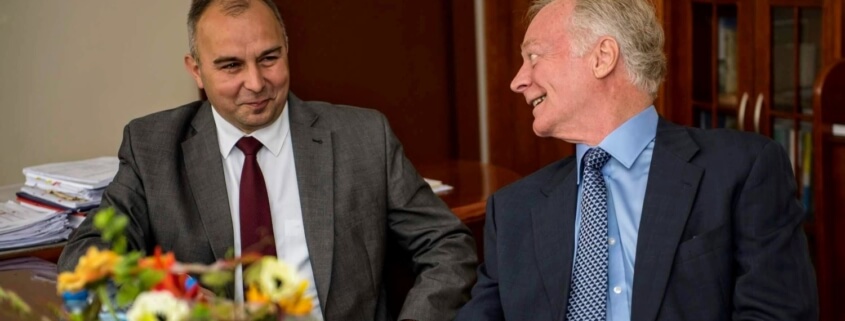The Importance of English for Global Business
Why is it that so many young people around the world want to learn English? It’s not only because of the beauty of the language, but also the economy, or rather the business world. English is the language of global business, and youth around the world understand that to be able to participate and benefit from it, they need to speak the language. In an earlier post, the importance of English for education and unity, international staff described how English is used in their communities. For this next in a series, we examine the impact of English education in four partner communities: Cuba, Greece, Poland and Peru.
The Harvard Business Review reports in 2021, about 1.35 billion people worldwide speak English either natively or as a second language. It seems like an impressive number, but it leaves 85% of the world population who don’t speak the language. Only 5% of the world population live in countries where English is the primary language. However, if you want to be part of the business world, you must speak English. For those out of the 85% who don’t speak English yet want to enter the business world, learning English becomes a necessity.

Various underlying factors make English the language of global business, including British colonialism, the economic strength of English-speaking countries, and the influence of the U.S. after the Cold War. But the rise of English as the primary language in business started approximately five decades ago. In the 1970’s, one of the first companies to establish English as their corporate language was KONE, a Finnish elevator company. Forty years later, in 2010, Hiroshi Mikitani, CEO of the Japanese e-commerce company Rakuten, abruptly declared English their corporate language. At the time, only 10% of Rakuten’s employees spoke English. All were given two years to become fluent in English or face demotion. “It’s stupid for a Japanese company to only use English in Japan when the workforce is mainly Japanese,” said the CEO of Honda Motors Takanobu Ito at the time. Nevertheless, after five years, Rakuten had increased its user base from 200 million to 1.1 billion and doubled its net revenue. During the same period, English became the corporate language at Honda, and Ito was gone.
Rakuten’s Mikitani calls this phenomenon “Englishnization” as multinational companies everywhere convert. In fact, according to Tsedal Neeley, professor at Harvard Business School author of The Language of Global Success: How a Common Tongue Transforms Multinational Organizations , at least 60% of multinationals worldwide officially use English to do business. This doesn’t account for the companies which unofficially operate in English because labor laws do not allow them to change the working language.
Conversational English in Poland
International corporate competition has pushed English beyond individual firms and to the national level. For instance, after Poland became a democracy in 1989, it entered a competitive global market that demanded English speakers for successful trade negotiations and the international growth of Polish businesses. Our community partners in Siedlce County, Poland, have understood this from the beginning, and requested help with English classes from Global Volunteers that same year. More than 30 years later, the significance of English for Polish businesses has only increased. The county government credits Global Volunteers for the English fluency of a majority of their young adults who attended schools where volunteers have worked.

Dorota Wierzbicka, Director of International Operations and Poland Country Manager explains, “English is the language of communication between businesses and companies from all the EU member countries.” Because of that, the Polish national government and the local government in Siedlce promote English education and provide English classes in public schools. Global Volunteers aids this effort by providing free conversational English classes to children and teenagers in Poland. “Volunteers offer this unique opportunity to practice what students learn with their Polish English teachers, improve their pronunciation and listening skills to ensure they would both understand and be understood when they will need to communicate in English in the future,” Dorota says and adds, ”helping the students, especially from the rural schools learning this skill is really crucial for their future success in life.”
Conversational English in Greece
Just as English has been key to raise Polish businesses and national economy out of economic stagnation, the same will be true for the Greek economy this year. In 2020, Greece experienced an 8.2% economic contraction, on of the worst in the European Union. Hopes for an economic recovery are based on the recovery of the tourism industry. As Reuters reports, “Greece expects a steady resumption of its vital tourism industry with arrivals this year at 50% above the levels in 2020 when demand collapsed.” According to the Institute of the Greek Tourism Confederation (INSETE), tourism is one of the most important economic activities in Greece, amounting for approximately 12% of the GDP. Our host island of Crete provides over a quarter of Greece’s revenue in tourism. And even more significant, the tourism industry provides jobs for 411,000 people in accommodation and food service industries alone. If all tourism-related activities are considered, tourism accounts for approximately 40% of all employment in Greece – most seasonal.

This will not be the first time the tourism industry spearheads economic recovery in Greece. The same happened after the 2015-2016 economic crisis, and an English-speaking labor force was essential to the recovery. Greeks understand that professional opportunities depend on their ability to speak English. As Greece Country Manager Sam Pinakoulaki shares, “in Greece, English has long been a critical part of a student’s education, playing a dominant role in their future prospects, even more so since the financial crisis in 2015. Consequently, Greek students’ were motivated; it gave them the incentive to learn English- a “wake-up call” and, for many students, a willingness not just to learn basic conversational English, but English at its highest level- proficiency. A necessity if they desire to study and work abroad.” Even the young ones understand how important English is to their academic and processional success. Twenty-two 6th grade students at Global Volunteers’ summer school in Crete were asked, “Do you think it’s important to learn English? if yes, why?” Here are some of their answers:
- I like the English culture.
- It is an international language that we all need to know.
- I want to work abroad.
- I need a certificate for university.
- I like meeting/ talking to foreigners.
- It broadens my horizons.
- I like it as a language.
- I want to travel abroad.
- It will help me find a job in the future.
- I want to study abroad.
Conversational English in Cuba
Meanwhile in the non-governmental organizations (NGO) arena, 12 out of the 13 major international NGOs, including the International Monetary Fund, the United Nations, and the World Health Organization, declare English as their official language. Global Volunteers Community Partner Gema Montes, from the Cuban Council of Churches in Cuba, says, “we know that English is the universal language for global business and trade. But because it’s also the official language at international organizations, it’s so helpful in providing more opportunities for Cubans.” In a country where some of the most sought after careers are in diplomacy and the tourism industry, English is a must. Gema says Global Volunteers’ contribution has been to help students develop a better vocabulary and raise their English-speaking confidence level. “We have many good testimonies from the students on how volunteers have helped them with this vital skill,” she says.

Conversational English in Peru
Even in the public sector of non-English-speaking countries, English is required for jobs such as diplomacy, research, international peacekeeping missions, and English teaching. In communities where educational and professional opportunities are scarce, acquiring this skill can make the difference between a life in the streets and a successful career. A previous post documented the impressive career development of Liz Díaz, who as a teenager spent long hours wandering the streets of Lima, but after learning English at our Peruvian partner’s community Sagrada Familia, became a professional English teacher at the children’s community.
“My success is a consequence of the many volunteers who serve our community,” Liz says. “They made a huge impact in my life. They saw great potential in me when I was not able to see it. And now, Global Volunteers continue to help my brothers and sisters. Each one of them, like grains of sand on a beach, make a difference.” Enabling Liz to become a teacher in the community she grew up in, and to develop her career has now gone beyond satisfying the demands of the business world. In the end, the impact of the volunteers who taught her is now felt by the children she teaches English to. And the benefit continues.
You may also like:




Leave a Reply
Want to join the discussion?Feel free to contribute!